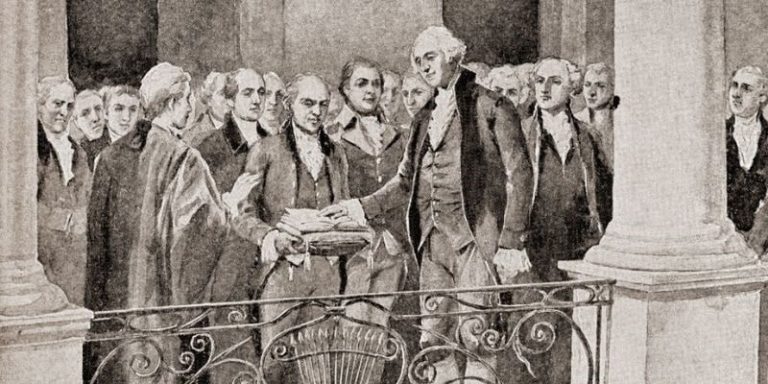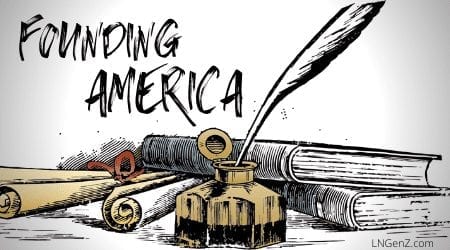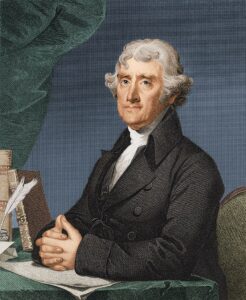The Founding Fathers On Business
What did the Founders think about commerce, the government, and success?
By: James Fite | December 21, 2021 | 984 Words

(Photo by: Universal History Archive/Universal Images Group via Getty Images)
Business and money are always important topics in society. Whether it is working for large companies or starting small businesses, many people rely on commerce to make a living. The government can regulate private businesses in some ways – such as making rules on health and safety – but there are limits to how much it can interfere.
After the Founders established the United States, the government was small, and it didn’t interfere much in business. There weren’t many government rules that companies had to follow. The Founders fought against government interference after the British had made all kinds of unfair laws favoring some businesses and punishing others. For example, the Tea Act of 1773 allowed the British East India Company to sell Chinese tea in America without paying taxes – while American companies had to pay tax. That law led to the Boston Tea Party – a major event in starting the Revolution.
The Founders did put some limits on business. The U.S. Constitution has a “commerce clause” that gives Congress the power to make laws on “commerce with foreign nations, and among the several states, and with the Indian tribes.” Over time, more and more laws have appeared in the U.S. that regulate what a business can and can’t do.
 In 2020 and 2021, the topic of government and business got a lot of attention due to the COVID pandemic. Businesses were ordered to close in cities across the nation. Many employees were prevented from working and lost their jobs, instead having to rely on money from the government. President Joe Biden ordered private businesses with over 100 employees to make sure their workers are vaccinated against COVID – or fire them. Many have questioned whether he had the power to interfere so much in private businesses, and court cases have challenged the order.
In 2020 and 2021, the topic of government and business got a lot of attention due to the COVID pandemic. Businesses were ordered to close in cities across the nation. Many employees were prevented from working and lost their jobs, instead having to rely on money from the government. President Joe Biden ordered private businesses with over 100 employees to make sure their workers are vaccinated against COVID – or fire them. Many have questioned whether he had the power to interfere so much in private businesses, and court cases have challenged the order.
Over the centuries, government and business have changed in America. But what did the Founders think about commerce?
Business and Government
The Founding Fathers of the United States wanted a government that was ruled by the people, not a people ruled by a government. To sum up how the Founders felt about government, take this quote from Thomas Paine:
“Society in every state is a blessing, but government even in its best state, is but a necessary evil; in its worst state, an intolerable one.”
Thomas Jefferson was the third president of the United States, but before that, he wrote the Declaration of Independence. In his first inaugural address on March 4, 1801, Jefferson said:
“A wise and frugal government, which shall restrain men from injuring one another, shall leave them otherwise free to regulate their own pursuits of industry and improvement, and shall not take from the mouth of labor the bread it has earned. This is the sum of good government.”

Thomas Jefferson (Photo by Stock Montage/Getty Images)
According to Jefferson, the government should leave the people to make money in their own way, and not take away the profits earned. Jefferson is also reported to have said:
“If we can but prevent the government from wasting the labours of the people, under the pretense of taking care of them, they must become happy.”
John Adams, the second president, thought that private property was essential to freedom. According to Adams, a government should protect the people’s right to own things without interference:
“The moment the idea is admitted into society that property is not as sacred as the laws of God, and that there is not a force of law and public justice to protect it, anarchy and tyranny commence.”
The author of the Bill of Rights, James Madison, suggested that one of the main jobs of government was to protect people’s property:
“Government is instituted to protect property of every sort … that alone is a just government which impartially secures to every man whatever is his own.”
Business Sense
George Washington was the first president and the leader of the colonists’ army during the Revolutionary War. He suggested that a population participating in business and trade can achieve a lot:
“A people … who are possessed of the spirit of commerce, who see and who will pursue their advantages may achieve almost anything.”
When the U.S. was founded, the Industrial Revolution was only just starting. Much of the economy was still agrarian, relying on farming and plantations. Unfortunately, several of the Founders used slave labor to build their fortunes. Others relied on inherited money. On the other hand, some of the Founders started their own businesses.
Thomas Jefferson started a nail-making business to make extra money while managing his Monticello estate, though the work was done by slaves. Some Founders worked as doctors or lawyers – including John Jay, who began his own law office in New York. Alexander Hamilton was a successful entrepreneur, too. He and Aaron Burr were part of a group that founded the Bank of New York.
One of the greatest American businessmen was Benjamin Franklin. He didn’t come from a wealthy family – his father could only afford to send him to school for two years. Despite this, his business ventures made him rich. He bought The Pennsylvania Gazette, turning it into one of the most successful newspapers of the time. He also had successful printing and publishing ventures.
According to Franklin, trade and commerce could only be good for the country:
“No nation was ever ruined by trade, even seemingly the most disadvantageous.”
Many of Franklin’s famous quotes are about how to get ahead in business and life. Here are some of his tips:
- “Early to bed and early to rise makes a man healthy, wealthy and wise.”
- “To succeed, jump as quickly at opportunities as you do at conclusions.”
- “Diligence is the mother of good luck.”
- “Sloth makes all things difficult, but industry all easy.”
- “God gives all things to industry.”
















